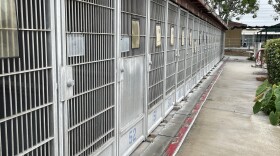Two weeks after an orphaned black bear cub was rescued and transferred to the San Diego Humane Society's Ramona Wildlife Center, the animal is gaining strength and appears to be in good health, officials said Wednesday.
The 7-month-old cub was rescued by the California Department of Fish and Wildlife in Bishop on Dec. 15 and transferred to SDHS for care.
The cub weighs around 30 lbs. and appears to be in good health, SDHS veterinarians said.
The animal's caretakers said the cub is eating a diet of eggs, honey, grasses, walnuts, gruel and fish.
"This little bear is very active and eating well," said Andy Blue, campus director of the Ramona Wildlife Center. "It is our goal to get them stronger and keep them healthy for at least three months, so they can return to the wild where they belong."
According to the Humane Society, the facility veterinary medical team has performed a visual exam on the cub and will schedule a full exam under anesthesia early in the new year to determine the gender of the bear, do blood work, a dental check and X-rays.
The cub is being housed at the center's hospital facility with indoor- outdoor access. The veterinarians plan to move the bear to a larger pre-release enclosure outdoors in the near future. The bear will then also get acclimated to the weather and have more opportunities to run, climb, play and forage for food.
In the wild, bear cubs would stay with their mother for about two years. The Project Wildlife team is attempting to minimize human contact to reduce the risk of habitation or food conditioning and increase their chance of survival in the wild.
There are now four California black bear cubs at San Diego Humane Society's Ramona Wildlife Center. The three other cubs arrived separately in July and will be released back into the wild next spring.







